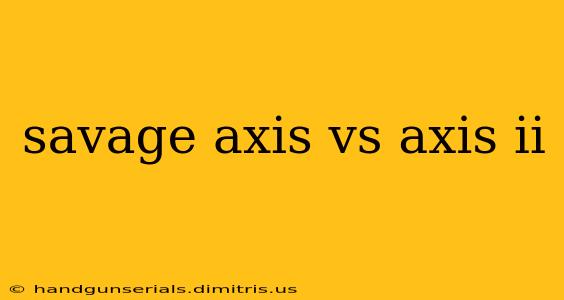Choosing the right hunting bow is a crucial decision for any archer. Two bows frequently mentioned in discussions among hunters are the Savage Axis and the Axis II. While both boast impressive features and performance, understanding their key differences is vital for selecting the bow best suited to your individual needs and hunting style. This comprehensive comparison delves into the nuances of each bow, examining their draw weight, speed, accuracy, and overall hunting capabilities.
Design and Construction: Subtle Differences, Significant Impact
Both the Savage Axis and the Axis II are known for their robust construction and durable materials. However, there are subtle differences in their design that contribute to their unique performance characteristics. The Axis II, often touted as an upgrade, typically incorporates advancements in limb technology and cam design, leading to potentially improved accuracy and efficiency. The Savage Axis, while a solid performer in its own right, may not incorporate the same level of technological refinement found in its successor. These subtle design variations often translate into noticeable differences in shooting experience.
Limb Technology: The Heart of the Bow
Limb technology is where the most significant differences between these two bows often lie. While both utilize high-quality materials, the Axis II frequently employs more advanced limb designs which, in turn, can result in enhanced speed and energy transfer. This translates to a flatter trajectory and increased kinetic energy, leading to improved penetration and overall effectiveness in hunting situations.
Cam System and Draw Cycle: Smoothness and Efficiency
The cam system is integral to the bow's draw cycle and overall feel. While both bows aim for a smooth draw, subtle differences in cam design between the Axis and the Axis II can impact the smoothness and consistency of the draw cycle. The Axis II might exhibit a more refined draw cycle, reducing hand shock and providing a more consistent release. This subtle difference can lead to improved accuracy and a more pleasant shooting experience, particularly for hunters who will be shooting multiple times during a hunt.
Performance Comparison: Speed, Accuracy, and Energy Transfer
Directly comparing the speed and accuracy of the Savage Axis and Axis II necessitates considering factors such as draw weight, arrow choice, and tuning. However, general observations based on user reviews and expert opinions suggest that the Axis II tends to offer slightly higher speeds and enhanced accuracy. This increased efficiency can be attributed to improvements in limb and cam technology. Higher arrow speeds translate to flatter trajectories, making long-range shots more predictable and accurate.
Accuracy and Consistency: A Matter of Precision
Accuracy isn't solely about speed; consistency is just as vital. Both bows strive for precision, but subtle differences in cam design and manufacturing tolerances might lead to variations in group size. User experience suggests that the Axis II might offer slightly tighter grouping at longer ranges due to its more refined design and manufacturing processes.
Hunting Applications: Choosing the Right Tool for the Job
Both the Savage Axis and Axis II are suitable for a wide range of hunting applications, from bowhunting deer and elk to smaller game. The choice largely depends on individual preferences and hunting styles. The Axis II, with its enhanced speed and accuracy, might be preferred for long-range shots or challenging hunting situations where precision is paramount. The Savage Axis, while possibly offering slightly less speed and accuracy, remains a viable and dependable option, particularly for hunters who prioritize a more budget-friendly option.
Conclusion: Informed Decision-Making is Key
Selecting between the Savage Axis and Axis II requires careful consideration of individual needs and preferences. While the Axis II often boasts technological advancements resulting in enhanced speed and accuracy, the Savage Axis remains a reliable and effective hunting bow. Ultimately, the best bow is the one that fits your style, budget, and hunting needs. Consulting with experienced archers and trying out both bows before making a purchase is highly recommended. Remember to factor in your draw weight preferences and shooting style to make the most informed decision possible.

